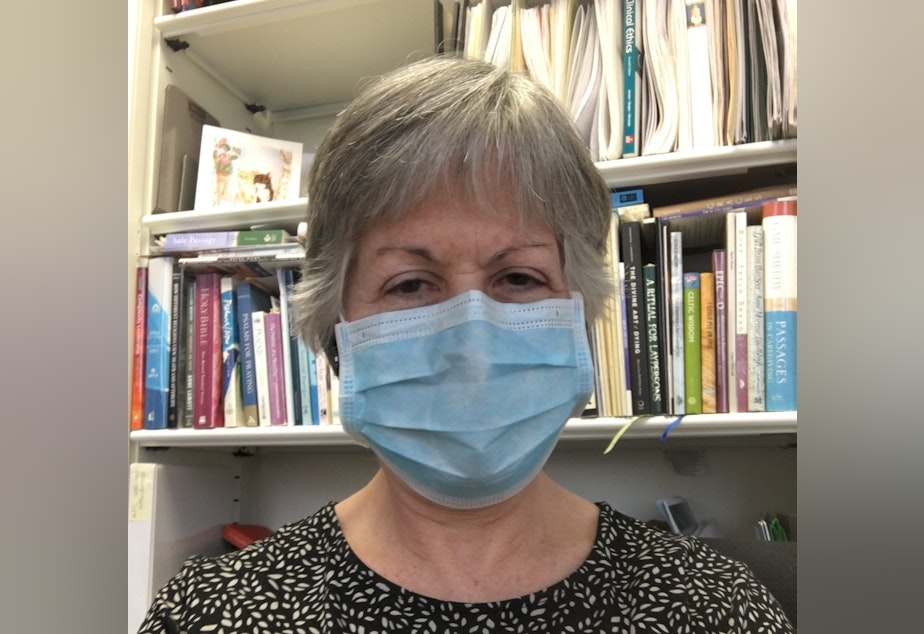With family visits on hold, Washington hospitals strain to comfort sickest patients

Dr. Rajneet Lamba helped care for some of Washington’s first Covid-19 patients at EvergreenHealth in Kirkland.
“They are alert, and they’re very, very anxious because I’m telling them about the uncertainty of their diagnosis and their prognosis,” he said.
Lamba and other health care providers are struggling with one of the hardest consequences of the coronavirus pandemic: a ban on most hospital visitors, just when patients most need the support.
The restrictions are "causing a high level of distress for the patients and families, and also for the staff caring for them,” said Dr. Gregg Vandekieft, a palliative care physician based at Providence St. Peter Hospital in Olympia.
Right now, most hospitals allow visits only in very limited situations, such as when patients are near death.
The restrictions are intended to reduce the spread of the coronavirus, and to conserve personal protective equipment. At EvergreenHealth, that meant even in the case of dying patients, the visits are brief – about 15 minutes per one-hour period.
EvergreenHealth’s manager for spiritual care, Kris Stone, said those guidelines also mean just one visitor per day,
Sponsored
“Because even one person at a time, if you had a procession of individuals that would burn through limited PPE pretty quick,” he said. “So it was designating, what would be the most impactful, what would be the most meaningful.”
For similar reasons, hospital staff like medical specialists and chaplains have turned to technology, such as using video chats rather than entering patient rooms.
Deborah Thompson is manager of spiritual care at Swedish Medical Center in Seattle. She said at first she and her colleagues resisted the awkwardness of virtual meetings with patients and their families.
But then they had a case where that move was necessary.
“It all unfolded in just an extraordinary way,” she said.
Sponsored
Thompson said they used an iPad to bring a dying patient’s family into the hospital room.
The chaplain “asked the family to send photos and those were printed out and placed in a position in the room where the patient could see them,” Thompson said. “And we could show the family that the patient could see their faces.”
If dying patients don’t have family or friends, the organization “No One Dies Alone” trains volunteers who provide companionship. But Stone said those volunteers can’t have access right now.
He said staff members recently got concerned about one of their longtime non-Covid patients went into rapid decline. Stone said the man “started showing signs of actively dying and does not have anyone in his life.” So it was the nursing staff and chaplains who stayed with him.
“Just reading and talking to him and spending time,” Stone said. “Our nursing staff and our chaplains have stepped up to provide that ‘no one dies alone’ support.”
Sponsored
Stone said he’s struck by hospitals’ rapid embrace of new technology to fill the current gaps.
He said in the reaction has been: "OK we’re doing it tomorrow."
Hospitals are getting tablets and computers on hand so patients can video conference with family, chaplains and medical specialists, even if they don’t bring their own devices from home.
Vandekieft, the palliative care physician, said he’s meeting with some patients from the doorway of their rooms, and talking to others by video. He said these virtual meetings are more satisfying than he expected.
“Patients actually engage people across devices with a deeper level of intimacy than I might have predicted,” he said. "So I really think there is a role for spiritual care to be able to serve patients even through virtual encounters.”
Sponsored
Vandekieft said the visiting restrictions are prompting some families to take their loved ones home. He recently assisted with the transfer of a non-Covid patient.
“Whose daughter kept saying, ‘We just want our entire family to be around her showering her with love in her final days of life,’” Vandekieft said. “Happily, we were able to get the mother home and that’s exactly what the family is doing now.”
Deborah Thompson at Swedish said in the wake of this pandemic, she’ll never view patient contact the same way.
“Our ability to sit with someone and hold their hand is going to be more precious than it ever has been," she said.




